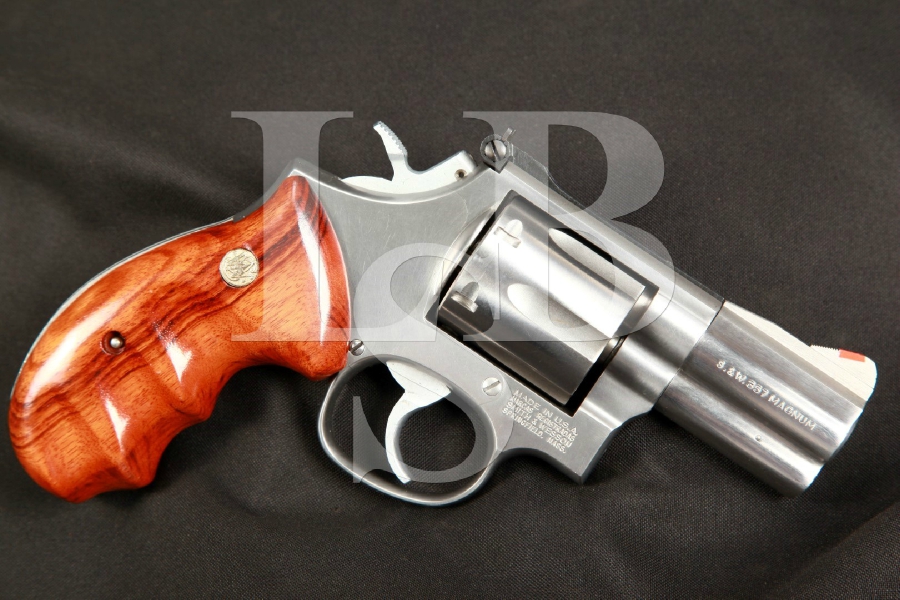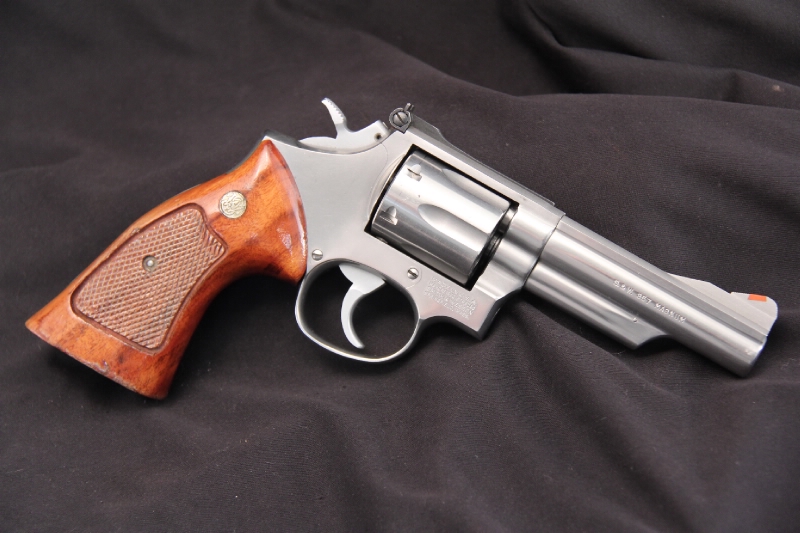In 2005, S&W recycled the model number 520 for an alloy L-frame.357. Work in Progress. I am by no means an expert on Smith & Wesson revolvers. Most of this information is just stuff I’ve picked up from window shopping for Smith & Wesson revolvers over the years. S&W Model 19,.357 serial number question Have a Model 19 in.357. I am trying to find a year and month of manufacture. Has the diamond grips. Under the grips, on the frame, there is a stamped 3 902xx. On the “swing arm” for the cylinder there are two sets of numbers. One is: 902xx D5. Smith And Wesson Highway Patrolman 357 Serial Number Lookup Family owned by the Wesson Family from 1874–1965. S&W Model 28-2 Highway Patrolman Revolver Description: Serial #N251703,.357 Magnum, 4 inch barrel with an excellent, bright bore. The S&W.357 Highway Patrol is the Model 28.
Smith And Wesson 357 Magnum Serial Number Lookup
LSB#: 180216WJ04
Search: Smith And Wesson Serial Number Search. If you are not found for Smith And Wesson Serial Number Search, simply check out our links below.
Make: Smith & Wesson
Smith and Wesson Serial Number Date of Manufacture J Frame Revolver Lookup. For models 36, 37, 38, 49, 50 and pre model number versions. 1950 = start at 1. With the serial number that you have provided,your Smith and Wesson K-38 was made in the year 1956. What is date of manufacture of smith and Wesson k7 serial 61277? There is no such model number. Does anyone have a list of the various S&W 686 serial numbers and the year they were made? Also, how does one tell which generation a S&W revolver is? Last edited by JontheCynic; at 01:08 AM. Revolvers have the serial number stamped in the bottom of the grip frame. Newer models also have the serial number under the yoke, by the model number. Each time a significant engineering change was made, a dash number was assigned. Example: Mod 686-4. This would indicate the 4th engineering change to the basic 686. Of course nothing can be.
Model: 686-1 ‘The .357 Distinguished Combat Magnum’, Square Butt, L-Frame
Serial Number: AYH3554
Year of Manufacture: 1986-87 (Standard Catalog of Smith & Wesson, 3rd Edition by Richard Nahas & Jim Supica, page 271)
Caliber: .357 Magnum
Action Type: 6-Shot, Double / Single Action, Swing-Out, Fluted Cylinder Revolver.
Markings: The left side of the barrel is marked “SMITH & WESSON”, the right is marked “S.&W. 357 MAGNUM”, the left side of the frame has S&W’s monogram logo, the right has the four line Marcas Registradas. The yoke cut is marked “AYH3554 / M / M686-1”. The yoke is marked “B3 / S / 83499” The back of the cylinder is marked “V”, the ejector rod cutout is marked “S”. The left side of the grip frame is marked “F4 / B3 / S / 83499”, the butt is marked with the serial number, the right is marked “W” in circle, “L” in triangle, and “7841”.
Smith And Wesson 686 Problems
Barrel Length: 6”, with full underlug and wide solid, serrated rib.
Sights / Optics: The front sight is a patridge blade on a sprung rocker with four small allen-head screws at the center numbered 1-4. Under the rocker is a dial which allows one to change the elevation setting of the sight to one of four pre-set positions which can each be individually adjusted using the four screws. The rear of the blade has been painted orange. The rear sight is a flat top, square notched leaf in a base that is micrometer-click adjustable for windage and elevation. The edges of the notch have ben painted white.
Stock Configuration & Condition: The grips are one piece pebble textured black rubber Hogue grips with finger grooves which leave the serrated backstrap exposed. The grips have a couple of light scuffs and handling marks, but no rips or tears. The grips rate in about Excellent overall condition.
Type of Finish: Stainless Steel
Finish Originality: Original
Bore Condition: The bore is bright and the rifling is sharp. There is no erosion in the bore.
Overall Condition: This pistol retains about 92% of its metal finish. The right side of the barrel has horizontal scratches on the side of the barrel and lug from the muzzle back about 3″ and the barrel has a few other light, scattered marks. The frame has scuffing on the left- and right-front between the cylinder and barrel, a light scratch under the cylinder on the left side, light scuffing at the rear under the grip, a knick in the bottom edge of the topstrap on the right side, and some scattered light scuffing not easily seen in the stainless finish. The sideplate has scattered light scuffing and the front sideplate screw has a mark to either side of its slot. The cylinder has a light turn line with some scattered light scuffing on the outside. The front and rear screw heads have some tool marks while the middle remains sharp, the grip screw head is sharp as well. The markings are clear. Overall, this handgun rates in about Fine condition.
Mechanics: The action functions correctly. The cylinder produces light side to side play with very little back play in full lockup of all 6 chambers. The double action trigger pull is smooth, the single action is crisp. We did not fire this handgun. As with all used firearms, a thorough cleaning may be necessary to meet your maintenance standards.

Box, Paperwork & Accessories: This revolver comes with a blue plastic Smith & Wesson box with gray foam lining. The exterior has light-moderate scuffs and scrapes. The foam lining has worn and discolored lightly with age. Overal, the box is in about Very Good condition.
Smith And Wesson 357 Magnum Serial Number Lookup By Name
Our Assessment: This is a well balanced, double action revolver from Smith & Wesson that has gained notoriety as one of the most effective home defense and duty pistols ever made. This model is considered by some to me more desireable than a comparable, factory-new model due to the frame mounted firing pin and lack of frame-mounted key-lock. The “M” marking in the crane cut indicates that it was returned to Smith & Wesson in 1987 under recall and was returned after modifcation at the factory or warranty station. This revolver would make a fine home defense handgun, hunting sidearm, or addition to a collection lacking a revolver but where it will really shine is in silhouette matches. With its adjustable front sight which can quickly change between four preset elevations, this revolver will make short work of chickens, pigs, turkeys and ram (the steel ones). Please see our pictures and good luck.
CA Legal or CA Private Party Transferable: This handgun CANNOT be transferred as a dealer sale in California. This handgun CAN be sold as a Private Party Transfer (PPT) at our Simi Valley shop. All cartridge firing handguns (even C&R’s and antiques) sold to a California resident must be DROS’d. This does not apply to out of state residents.
| Smith & Wesson Model 686 | |
|---|---|
A Smith & Wesson Model 686, with a 100 mm (4 in) barrel. | |
| Type | Revolver |
| Place of origin | United States |
| Service history | |
| Used by | See Users |
| Production history | |
| Designed | 1980 |
| Produced | 1981–1999, 2012–present |
| Variants | |
| Specifications | |
| Mass | 1.25 kg (2.8 lb) |
| Length | 305 mm (12.0 in) |
| Barrel length |
|
| Cartridge | |
| Caliber | .38 |
| Action | Double action and single action |
| Feed system | 6-round (686) or 7-round (686 Plus) cylinder |

The Smith & Wesson Model 686 is a six- or seven-shot double-actionrevolver manufactured by Smith & Wesson and chambered for the .357 Magnumcartridge; it will also chamber and fire .38 Special cartridges. Smith & Wesson introduced the Model 686 in 1981. It is the stainless steel version of the Model 586, which featured a blued steel finish. They are available ported and unported with a choice of 6- or 7-round cylinders.[1]
The Model 686 is based on S&W's L (medium) revolver frame. During the 1980s, Smith & Wesson developed its L-Frame line of .357 Magnums: the Model 581, Model 586, Model 681 and Model 686. The Models 581 and 681 have fixed sights, whereas the 586 and 686 use adjustable sights.[2]
Variants of the 686[edit]
The 686 has been available with 64, 76, 102, 127, 152, and 211 mm (2.5, 3, 4, 5, 6, and 8.325 in) barrel lengths as standard models and other barrel lengths either by special order from S&W's Performance Center custom shop, or acquired from or built by after-market gunsmiths. The Performance Center made a limited number of Model 686s chambered for .38 Super cartridges for competitive shooters.[1]
The 686 features a 6-round cylinder. The 686P variant, marketed as the Model 686 Plus, has a 7-round cylinder. The 686PP variant, with PP designating PowerPort, has an integral compensator (also known as a muzzle brake).
The 686 has been made with pistol grips having a squared or rounded end (colloquially, 'square butt' or 'round butt'). The grips on the pistol can be changed, and multiple after-market options are available. Acer ms2310 drivers.
The Model 686 has an adjustable rear sight, and until 1992, the 152 and 211 mm (6 and 8.325 in) versions had the option of an adjustable front sight. They had Goncalo alveshardwood grips until 1994, when the grip was replaced by a rubber Hogue grip.[1]
Through the years, there have been several variations on the Model 686. The Model 686 Classic Hunter was introduced in 1988 and has a 150 mm (6 in) barrel and a non-fluted cylinder; the Model 686 Black Stainless was introduced in 1989 and has either a 100 or 150 mm (4 or 6 in) barrel with a black finish, with production limited to 5000; the Model 686 National Security Special was introduced in 1992 and has a 76 or 102 mm (3 or 4 in) barrel; the Model 686 Target Champion was introduced in 1992 and has a 150 mm (6 in) match-grade barrel, adjustable trigger stop, and walnut grips; the Model 686 Power Port was introduced in 1994 and has a ported 150 mm (6 in) barrel; the Model 686 Plus was introduced in 1996 and has a 64, 76, 102, or 152 mm (2.5, 3, 4, or 6 in) barrel, adjustable sights, 7-shot cylinder, and Hogue rubber grips. As with all current Smith & Wesson revolvers, the 686 Plus now has a key lock integral to the frame of the gun.[1]

| Variant | Caliber | Weight | Capacity | Year | Notes |
|---|---|---|---|---|---|
| 1.30 kg (45.8 oz) | 6 rounds | 1988 | Unfluted cylinder | ||
| 1.19 kg (42 oz) | 6 rounds | 1989 | Black finish over stainless, 5000 produced | |
| 1.15 kg (40.5 oz) | 6 rounds | 1988 | |||
| 1.19 kg (42 oz) | 6 rounds | 1988 | ||
| 1.30 kg (45.8 oz) | 6 rounds | 1988 | |||
| 1.37 kg (48.3 oz) | 6 rounds | 1988 | ||
| S&W 686 CS-1 | Unknown | Made for United States Customs Service | |||
| 1.17 kg (41.2 oz) | 6 rounds | 1992 | Black finish | |
| 1.19 kg (42 oz) | 6 rounds | 1992 | Black finish | ||
| 1.31 kg (46.2 oz) | 6 rounds | 1992 | Full lug | |
| 1.30 kg (46 oz) | 6 rounds | 1994 | Ported | ||
| 1.16 kg (41 oz) | 7 rounds | 1996 | Lockable with key | |
| 1.20 kg (42.3 oz) | 7 rounds | 1996 | Lockable with key | ||
| 1.31 kg (46.2 oz) | 7 rounds | 1996 | Lockable with key | |
| 1.15 kg (40.5 oz) | 7 rounds | 2004 | Half-lug barrel, HiViz front sight | ||
| 1.31 kg (46.2 oz) | 6 rounds | 2003 | Brushed gold finish with finger hardwood grips | |
| 1.31 kg (46.2 oz) | 6 rounds | Integral Compensator, lockable with key | |||
| 1.50 kg (52.9 oz) | 6 rounds | 2007 | Weighted barrel, Weaver/Picatinny rail on barrel, adjustable/removable weights, ball-bearing cylinder lock, forged Hhmmer and trigger, traditional old school pinned sSear, PC aluminum case or gun rug, lockable with key | |
Engineering and production changes[edit]
- 686 (no dash), 1981 Introduction model
- 686-1, 1986 radius stud package, floating hand
- 686-2, 1987 changed hammer nose, bushing and associated parts
- 686-3, 1988 new yoke retention system
- 686-4, 1993 change rear sight leaf, drill and tap frame, change extractor, Hogue grips
- 686-5, 1997 change frame design to eliminate cylinder stop stud, eliminate serrated tangs, MIM hammer and trigger, change internal lock.
- 686-6, 2001 internal lock
- 686-7, 2003 Performance Center .38 Super, 6-Shot unfluted cylinder, 4' barrel, Stainless Steel, 250 Made
Gallery[edit]
Users[edit]
- France – Used by GIGN during amphibious operations.[3]
- Norway – The 3'-barreled version with Goncalo alveshardwood-grip was used as a sidearm in the alien immigrant-branches of the Norwegian Police Service by individual plainclothes officers during the early 1990s.[citation needed]
- United States – Used by U.S. Border Patrol.[citation needed] Used by legacy U.S. Customs Service.[citation needed] Used by the legacy U.S. Immigration and Naturalization Service[citation needed] Used by U.S. Navy SEALs during waterborne missions.[4] Used by some smaller police departments and by individual officers in larger departments, especially in marine environments.[5]
- Luxembourg – Used by the Luxembourg Grand Ducal Police as duty weapon from the 1980s through 2017 when it was replaced by the HK VP9.[6]
- United States - Used by the Oso Grande 4x4 Posse as an approved weapon for posse members preferring a revolver. Some twenty revolvers were acquired in the early 2000's as issue/approved weapons.
Recall[edit]
In 1987, seven years after the release of the Model 686, there were reports of cylinder binding with some types of standard .357 Magnum ammunition for L-frame revolvers manufactured before August 1987. S&W put out a product warning and authorized a no-charge upgrade to make modifications to the revolver. All recalled and reworked guns were stamped with an M marking, signifying that they had been recalled and fixed; thus it is known as the M modification for all 686, 686-1, 586-1, and 586-2 revolvers.[7]
References[edit]
- ^ abcdSupica, Jim; Richard Nahas (2007). Standard Catalog of Smith & Wesson (3 ed.). F+W Media, Inc. pp. 331–363. ISBN978-0-89689-293-4.
- ^Boorman, Dean K. (2002). The History of Smith & Wesson Firearms. Globe Pequot. p. 119. ISBN978-1-58574-721-4.
- ^Jim Supica (2011). Standard Catalog of Smith & Wesson 3rd. Iola, wisconsin: Gun Digest Books. p. 343. ISBN978-1-4402-2700-4.
- ^Chalker, Denny; Dockery, Kevin (2009). One Perfect Op. New York: Harper Collins. p. 104. ISBN978-0-06-175129-5.
- ^Sweeney, Patrick (2011). The Gun Digest Book of Smith & Wesson. Iola, Wisconsin: Gun Digest Books. p. 104. ISBN978-1-4402-2714-1.
- ^'So sieht die neue Pistole der Police Grand-Ducale aus'. L'Essentiel. 19 January 2017. Retrieved 19 January 2019.
- ^Product Warning, Popular Mechanics, January 1988, p. 11.
Smith And Wesson 357 Magnum Serial Number Lookup 60 S
External links[edit]
Smith And Wesson 357 Magnum Serial Number Lookup Tool
